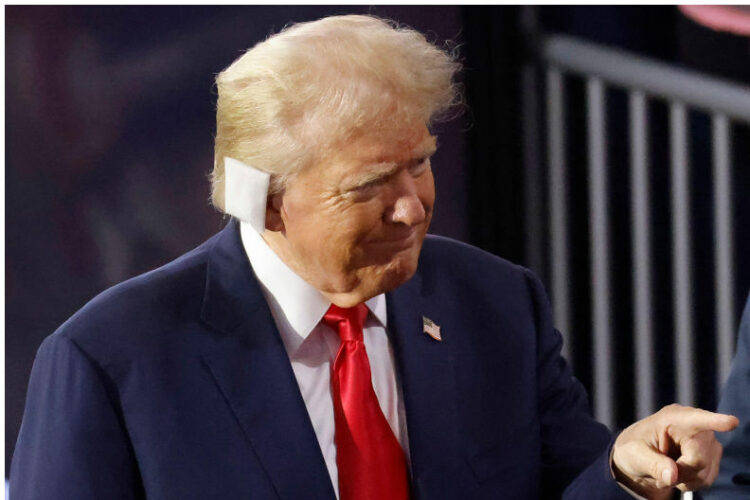Donald Trump and God: not a match made in Heaven
July 29, 2024
One of the more noteworthy features of the recent Republican convention was the reverential reception of Donald Trump. Even before Trump’s brush with death, eighty per cent of evangelical Christians supported him. What does this say about their beliefs and motives?
It was always inevitable that people would read a lot into the attempt on Donald Trump’s life. Apart from the predictable conspiracy theories, quite a few people seem to think he was spared by direct divine intervention. Even for those of us who do not subscribe to one of the competing explanations of God’s purposes, it does raise interesting questions about the continuing role of religion in a country that seems to take the transcendental realm much more seriously than its post-Enlightenment, Western counterparts.
I’m a professional agnostic, but if God’s around one would have to assume that saving Trump and apparently anointing him as the leader of an increasingly powerful and prominent Christian movement is His/Her/They’re idea of a joke, or a fiendishly inventive method of testing the faith of the flock. Theology is not my strong suit, but I don’t remember the bit in the Bible about the advantages of fame and power in enhancing the opportunities for sexual predation, for example, or rich men entering the kingdom of heaven.
And yet the fact that Trump is a convicted felon, a compulsive liar, a megalomaniac, an egomaniac, an aspiring fascist – and a serial sex offender, of course - doesn’t seem to bother his admirers. Nor does it concern the growing band of senior Republican figures who are now queuing up to bend the knee and swear allegiance to someone who - thanks to a Supreme Court stacked with his appointees - now has the power of a king. The very thing ‘ the founders’ wanted to avoid, of course.
Given that the American constitution is usually treated as an untouchable sacred text such rulings are surprising and have the potential to profoundly alter some of the foundational principles and beliefs that have, for better or worse, made America what it is today. But James Madison, one of the Founding Fathers and the fourth president of the US, recognised the importance of keeping a separation between church and state, not least because otherwise government would claim divine support, potentially giving them the power and authority to crush dissent.
It’s not too fanciful to suggest that we may be witnessing the beginning of precisely this possibility. As Trump himself declared in the aftermath of his near-death experience, “In a certain way I felt very safe because I had God on my side, I felt that.” The rest of Trump’s acceptance speech was the usual rambling fulmination against all the usual suspects, and not quite the uplifting pean to unity his aides had no doubt carefully crafted, but that’s unlikely to alienate his base, even the God-fearing parts.
It is, nevertheless, clear that some of his supporters are plainly more interested in the political possibilities opened up by Trump’s ‘miraculous’ survival than they are with biblical exegesis. The rise of ‘ Christian nationalism’ is one of the less reported aspects of Trump’s ascent, but likely to be an increasingly important part of what passes for a coherent Trumpian ideology. Not all its adherents are as dim or unfocused as Trump, however.
Christian nationalists want the government to declare the US a Christian nation, not least because they think they are engaged in a cosmic struggle between good and evil. Some of them are very powerful. Mike Johnson, the Speaker of the House of Representatives, is a prominent evangelical, and the decisions of key Catholic members of the Supreme Court like Trump appointees Amy Coney Barrett and Brett Kavanaugh will influence key legal judgements for decades to come.
It is increasingly likely that a less tolerant, evangelical form of Christianity will become an even more influential political force in defining America’s collective future, with major implications for all those who don’t fit in.
This is plainly why some, not obviously religious figures, like Trump, or his former national security adviser Michael Flynn, are happy to take advantage of an already powerful movement and source of support. Flynn can also expect to feature in Trump’s incoming team, not least because as well as being a ‘ paranoid Islamophobe’, he’s also ‘emerged as a full-fledged authoritarian’ who called on Trump to invoke martial law after the ‘stolen’ 2020 election.
Even before his elevation to the pantheon, Trump didn’t suffer from a lack of self-esteem, to put it delicately. Now that he is surrounded by adoring, uncritical flunkies - and opportunists like his reinvented vice-presidential nominee - who think that Trump is on a mission from God to restore the US to its former Christian glory and pre-eminence, he looks more like Caligula than Lincoln.
It has become commonplace to suggest that American democracy is in the balance and that civil unrest or even war is possible, but that doesn’t make such claims any less true or alarming. Trump’s increasingly probable return to the White House will be a major test of the faith of Australian governments, too. Canberra contains some of the most fervent believers in American power, principle, and capability anywhere on the planet. We must pray that they finally see the light before it’s too late.

